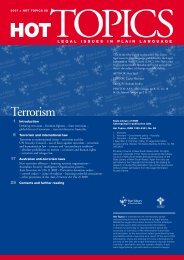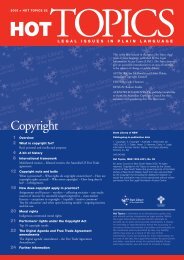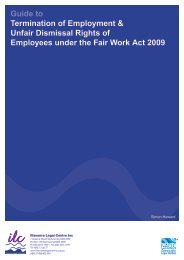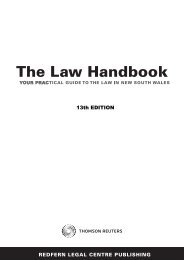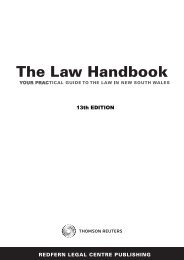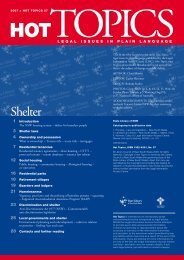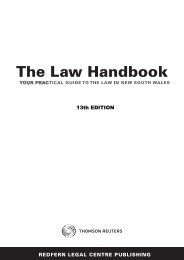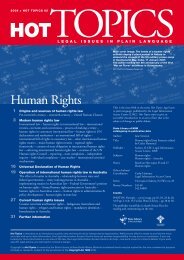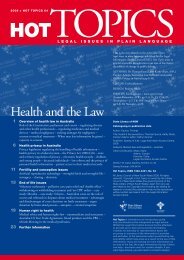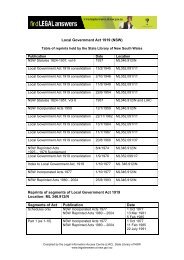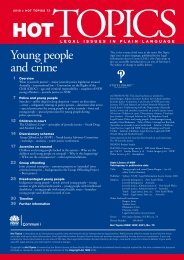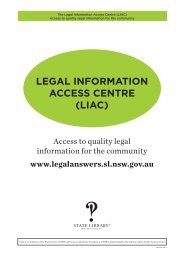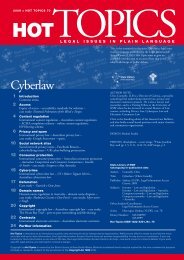Drugs and the law - Hot Topics 59 - Find Legal Answers
Drugs and the law - Hot Topics 59 - Find Legal Answers
Drugs and the law - Hot Topics 59 - Find Legal Answers
Create successful ePaper yourself
Turn your PDF publications into a flip-book with our unique Google optimized e-Paper software.
traffickable quantitiesA traffickable quantity of a drug is an amount deemedin <strong>law</strong> to be in a person’s possession for <strong>the</strong> purpose ofsupply. Some traffickable quantities are:> cannabis (leaf or heads) – 300 gm> heroin – 3 gm> amphetamines – 3 gm> ecstasy – 3 gm or 15 tabs> LSD – 0.003 gm or 15 tabs.Purity does not matter – only weight. Under <strong>the</strong> Act, onegram of a powder that is 10% heroin <strong>and</strong> 90% glucose istreated as one gram of pure heroin (section 4).Anybody found in possession of a traffickable quantityis presumed to be a supplier unless <strong>the</strong>y can proveo<strong>the</strong>rwise – for example, that <strong>the</strong> drug was intended forpersonal use, or disposal (section 29).<strong>the</strong> case of <strong>the</strong> sister’s stashA woman was found with ‘deemed supply’ quantitiesof cannabis <strong>and</strong> cocaine in her bedroom. She toldpolice that her sister had given <strong>the</strong>m to her to lookafter, <strong>and</strong> that if <strong>the</strong> sister had not picked <strong>the</strong>m up<strong>the</strong> next day she would dispose of <strong>the</strong>m. She wasfound guilty of possession, but not supply – becauseshe could prove that she was not in possession of <strong>the</strong>drugs for <strong>the</strong> purposes of supply (R v Carey (1990) 20NSWLR 292).police directions in public placesPolice can legally give a ‘reasonable direction’ to a personin a public place who <strong>the</strong>y believe on reasonable groundsis supplying, or soliciting supply of, or purchasingprohibited drugs. The direction must be ‘reasonable in<strong>the</strong> circumstances for <strong>the</strong> purpose of stopping’ <strong>the</strong> supplyor purchase. It is an offence to fail to comply with <strong>the</strong>direction without reasonable excuse (Law Enforcement(Powers <strong>and</strong> Responsibilities) Act 2002, section 197).ongoing dealingSection 25A of <strong>the</strong> Act creates a special offence ofsupplying drugs on an ongoing basis. The offenceinvolves <strong>the</strong> supply of a prohibited drug (exceptcannabis) on three separate occasions within a 30 dayperiod. The acts of supply must be for some financial oro<strong>the</strong>r material reward. They do not all have to involve<strong>the</strong> same drug.A charge of ongoing dealing could be laid where anundercover police officer buys drugs from <strong>the</strong> same streetdealer on three different days. The police are not obligedto arrest <strong>the</strong> dealer immediately after <strong>the</strong> first sale.The maximum penalty for ongoing dealing is a $385,000fine <strong>and</strong> 20 years jail, regardless of <strong>the</strong> weight of <strong>the</strong>drug supplied or <strong>the</strong> value of <strong>the</strong> transactions. This isequivalent to <strong>the</strong> maximum penalty for <strong>the</strong> supply of acommercial quantity of drugs (250 grams of heroin oramphetamine, or 500 grams of ecstasy).The NSW Court of Criminal Appeal has ruled that asentence for this offence of four <strong>and</strong> half years (with aminimum term of two <strong>and</strong> half years) is not excessive,even if <strong>the</strong> amount of drug supplied was only small <strong>and</strong><strong>the</strong> supplier was motivated by <strong>the</strong>ir own addiction ra<strong>the</strong>rthan greed 3 .This offence is classed as wholly indictable, which meansit must be finalised in <strong>the</strong> District Court ra<strong>the</strong>r than <strong>the</strong>Local Court. A person convicted of an offence under thissection (<strong>and</strong> o<strong>the</strong>r indictable offences) is not eligible tobe dealt with by <strong>the</strong> Drug Court.Large scale supplyHigher penalties apply for charges involving <strong>the</strong> supply of larger amounts of drugs. The Act divides trafficking offences into:> indictable quantities > commercial quantities > large commercial quantities. As with deemed supply, proof of possession of <strong>the</strong> relevant quantity is sufficient to establish that a person is guilty of that particular trafficking offence. The table shows <strong>the</strong> scheduled quantities.DRUG inDictable commeRciallaRGecommeRcialCannabis 1 kg 25 kg 100 kgleaf/headsHeroin 5 gm 250 gm 1 kgAmphetamine 5 gm 250 gm 1 kgEcstasy 5 gm/ 0.5 kg 2 kg25 tabsLSD0.005 gm/ 0.5 gm 2 gm25 tabspenaltiesThe maximum penalty for dealing with an indictablequantity of a drug is a $220,000 fine <strong>and</strong> 15 yearsimprisonment (10 years for cannabis).For a quantity of drugs in <strong>the</strong> commercial range, <strong>the</strong>maximum penalty is a $385,000 fine <strong>and</strong> 20 years jail(15 years for cannabis).For a large commercial quantity, fines of $550,000<strong>and</strong> life imprisonment (20 years for cannabis) can beimposed.[Note: penalties accurate as at 1 February 2007.]3. R v Smiroldo [2000] NSWCCA 120; available at http://www.austlii.edu.au/au/cases/nsw/NSWCCA/2000/120.htmlpossession, use <strong>and</strong> supply 11



